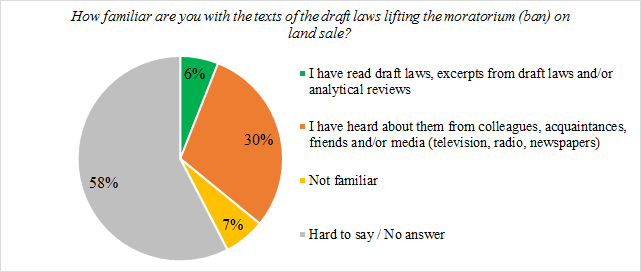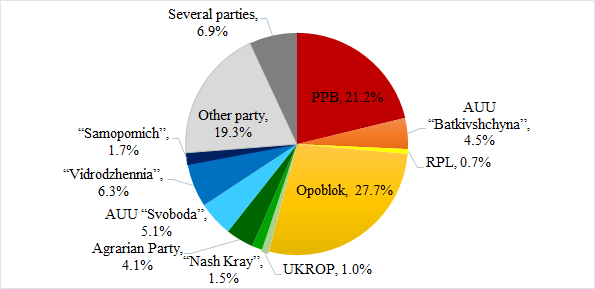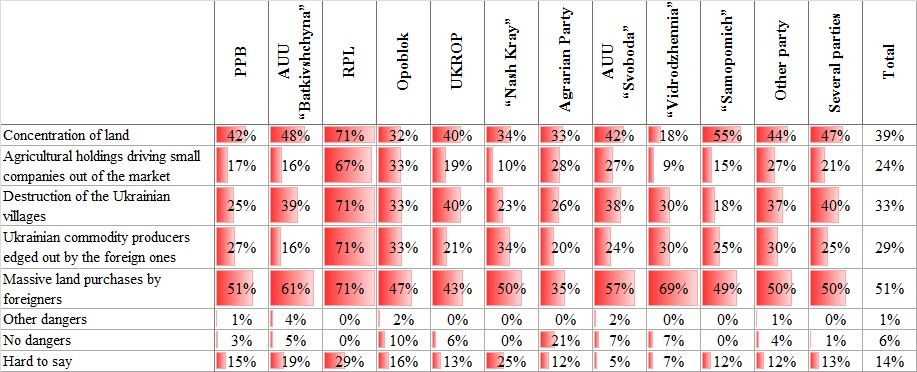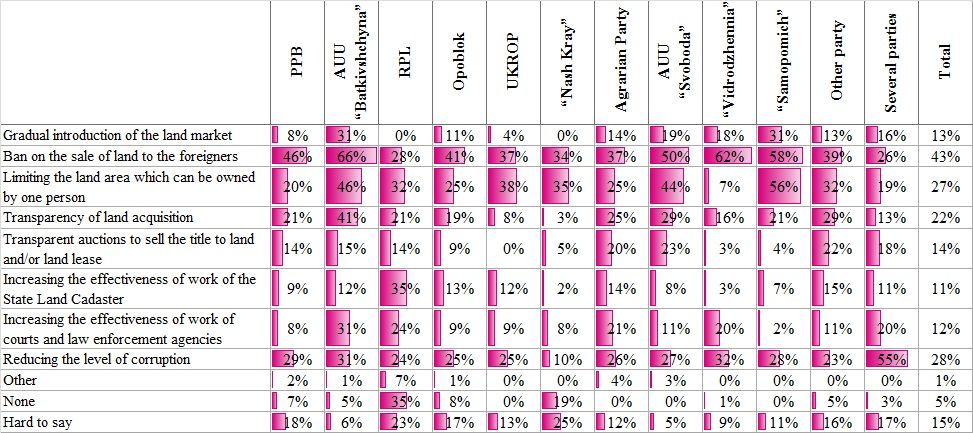How to analyze the role of political parties in raising awareness of the Ukrainians about the land reform? It is difficult, but possible to answer this question. The results obtained not only illustrate the influence of political parties on the formation of citizens’ opinions about the land market, but also show that the Ukrainians sometimes make contradictory conclusions due to conflicting information coming from different sources.
The impact was assessed on the basis of the public opinion poll “Actual Issues of Land Reform in Ukraine”[1], conducted within the USAID AgroInvest project, and the results of the local elections 2015.
A basis for public opinion-making
According to the public opinion studies, the attitude of citizens to the possibility to manage their own land independently is largely influenced by the consequences they anticipate: if someone expects that implementation of specific policy (for example, lifting of the moratorium) will be more positive rather than negative, they will approve of it; but if this person anticipates that negative consequences will prevail, then he or she will be against such policy.
Perception of advantages and dangers of lifting the moratorium depends on the information which serves as a basis for opinion-making. Analyzing how citizens form their attitudes towards different policies, Visser, Holbrook and Krosnick (2008) identify two ways how people learn about things which matter to them: (1) they take into account their own experience or (2) rely on the information from other people received in the course of informal communication or studying, or from media.
Those citizens who have dealt themselves with the policy, the attitude to which they are shaping, have their own experience. In case of the moratorium, these are owners of land shares, land managers, and other experts in the field of land relations, as well as those who received information having studied the legislation and analyzed factual information in this sphere. When it comes to issues which require a thorough understanding of the subject matter and/or access to factual data, it is obvious that not every citizen can make conclusions independently. In this case, external sources of information – media, friends, and acquaintances – play an especially important role. In addition, the ability to learn new information depends on the level of motivation, education and prior knowledge of the subject.
About 16.6% of Ukrainians who own land shares have direct experience of dealing with land issues. Approximately 6% of the population study legislation on their own or read analytical reviews. However, most Ukrainians receive information about the land reform in another way: 1/3 of the respondents receive information from television, newspapers, radio, and/or their colleagues, acquaintances or friends; the rest – almost 2/3 of the respondents – were either not familiar with the draft laws lifting the moratorium, or could not answer where they get the information from. This is demonstrated by the answers to the question: “How familiar are you with the texts of the draft laws lifting the moratorium (ban) on land sale?” (Figure 1).
Fig. 1. The level of familiarity of the Ukrainians with the texts of draft laws lifting the moratorium on land sale

It is possible to conclude on the basis of these data that the Ukrainians learn about the moratorium mainly from media: it is this information that they are most likely to discuss with their friends and acquaintances, and it is on this basis that they make their own conclusions.
The question is who forms the information content in the media – about the land reform in general and the moratorium in particular? Public politicians (usually leaders or representatives of political parties) play an important role in Ukraine, systemically communicating their ideas to potential voters: they speak from the parliamentary rostrum, in political talk shows, give interviews on the radio, in newspapers or online media, and create news (by organizing campaigns, press conferences, etc.) covered by the media.
How to research the role of political parties in public opinion-making?
It would definitely be interesting to research what Ukrainians think about the advantages and dangers of lifting the moratorium depending on the rhetoric of a particular political party they trust. Unfortunately, the poll has not covered such information. However, it is possible to analyze the role of political parties in raising awareness of the land reform in a different way.
In 2015, local elections [2] were held in each of the districts and towns where the respondents of the survey “Actual Issues of Land Reform in Ukraine” live. Most of the elected deputies represent political parties. In most towns and districts there is a party whose representatives have won the majority of votes in a particular local council.
We analyzed the differences in the attitude of Ukrainians to the lifting of the moratorium and their awareness of this issue, depending on which political party received the biggest support during the local elections. For several reasons we do not claim that this attitude is determined only by one fact, namely, which party representatives received the greatest support at the local level. First, a citizen can support this or that political power for reasons other than its attitude to the land reform. Second, citizens can form their attitude to the moratorium on the basis of rhetoric of several parties. At the same time, we assume that a great popularity of a party at the level of a town/district might mean that a significant part of the population trusts it. Accordingly, those people who trust the dominant party discuss the elements of its political position with their friends and acquaintances, which strengthens the party’s influence at the local level.
Results of the local elections
For the purpose of the analysis, we have singled out ten parties which received the biggest number of votes during the local elections in Ukraine in 2015: the Petro Poroshenko Bloc “Solidarnist” (hereinafter – PPB), the All-Ukrainian Union “Batkivshchyna”, the Radical Party of Oleh Liashko (RPL), the Political Party “Opposytsiynyi Blok” (Opoblok), the Ukrainian Association of Patriots (UKROP), the Political Party “Nash Kray”, the Agrarian Party of Ukraine, the All-Ukrainian Association “Svoboda”, the Political Party “Vidrodzhennia”, and the “Samopomich” Union (Samopomich).
As can be seen from Figure 2, almost 28% of the respondents lived in the administrative-territorial units where Opoblok received the greatest support during the local elections; more than 21% – in the units where the PPB was the most popular; 6.3%, 5.1%, 4.5%, and 4.1% of the respondents – in the localities where most votes during the local elections were given to “Vidrodzhennia”, the All-Ukrainian Association “Svoboda”, the All-Ukrainian Union “Batkivshchyna”, and the Agrarian Party of Ukraine respectively. Less than 6% of the respondents lived in the administrative-territorial units where the parties of “Samopomich”, “Nash Kray”, the UKROP, and the RPL were most popular. Other respondents, about one fourth, lived in the towns/districts where representatives of other political parties have received the biggest number of votes during the local elections or several parties received the same number of votes which makes it impossible to single out the most influential one.
Fig. 2. Division of administrative-territorial units whose residents took part in the survey “Actual Issues of Land Reform in Ukraine” – depending on which political party received the greatest support during the local elections 2015

Attitude towards the lifting of the moratorium and the dominant parties
As can be seen from Table 1, in general, the majority of the respondents (63%) do not approve of the lifting of the moratorium. Only 18% approve of it, while for another 19% it is hard to decide. It seems logical, since only 55% of the Ukrainians believe that the lifting of the moratorium might bring certain advantages for the country, while 80% see certain dangers in the lifting of the moratorium.
The attitude towards the moratorium and the recognition of the advantages/dangers of its abolition differ in the towns/districts depending on which parties received the largest number of votes there. For example, in those districts where the RPL, “Nash Kray”, “Vidrodzhennia”, the UKROP, and the All-Ukrainian Union “Svoboda” received the largest support, fewer residents support the lifting of the moratorium compared to other administrative-territorial units. Thus, among 0.7% of the respondents living in the towns/districts where the RPL was the most popular, no one supports the lifting of the moratorium; only 8% of them believe that this will bring at least some advantages for the country, while 71% think that this step is fraught with different dangers for the country.
Table 1. Attitude of the Ukrainians towards the lifting of the moratorium and the awareness of the advantages and dangers for the country in general – depending on which political party received the biggest number of votes during the local election 2015 in a town / district.

It is a paradox but 72% of the respondents living in the towns/districts where the AUU “Svoboda” received the greatest support believe that the abolition of the moratorium will bring benefits to the country. At the same time, 70% are still against the abolition.
Surprisingly, 27% of the respondents living in the towns/districts where the AUU “Batkivshchyna” has received the greatest support rather approve of the lifting of the moratorium, while 41% rather disapprove, despite the fact that the level of awareness of the advantages and risks of the lifting is almost the same as the average in the country. It is well-known that this political party declares its pro-moratorium stand. It is unlikely that this result of the poll – so loyal to the moratorium – can be explained by the fact that voters remember how Yulia Tymoshenko, the then prime minister, has in due time signed a Memorandum with the IMF supporting the introduction of the land market. Perhaps when it comes to land issues the residents of those regions trust the rhetoric of not only the “Batkivshchyna”, but also that of other parties. Orthey are not familiar with the program goals of the parties they vote for.
Parties also influence the awareness of the advantages and the dangers of the moratorium abolition
When it came to the awareness of the advantages and the dangers of the moratorium abolition, the Ukrainians had to choose one or several advantages and dangers for the country, which, in their opinion, might result from the lifting of the moratorium (see Tables 2-3). In this case, “awareness” meant personal knowledge and opinions of the citizens concerning the benefits and the dangers. They can reflect not only the objective reality, but also its subjective perception through the prism of people’s own experience and the information coming from external sources.
In general, the citizens believe that the abolition of the moratorium will have the following benefits for the country: development of rural areas (35%), development of farming and small agricultural enterprises (23%), increase in budget revenues (18%), and growth of investments (16%). At the same time, 19% of the Ukrainians think that lifting of the moratorium will have no advantages for the country. Another 26% of respondents found it difficult to answer this question.
As for the dangers of lifting the moratorium, the Ukrainians are mostly concerned that this will lead to massive land purchases by foreigners (51%), excessive concentration of land (39%), and destruction of the Ukrainian villages (33%). Another 24% of the respondents believe that after the moratorium is lifted, agricultural holdings will drive small companies out of the market, and 20% of them are afraid that Ukrainian commodity producers will be edged out by the foreign ones. Only 6% of the Ukrainians do not know any dangers of lifting the moratorium, while another 14% found it difficult to answer this question.
Table 2. Level of awareness of the Ukrainians about the advantages of introduction of agricultural land sale for the country – depending on which party received the biggest number of votes during the elections 2015 in a town/district (respondents could choose several answers)

None of the respondents from the towns/districts where the RPL received the greatest support believed that abolition of the moratorium will lead to the development of rural areas or development of farming and small agricultural enterprises. As can be seen from Table 3, such attitude of the RPL supporters to the land market is confirmed by their perception of dangers: more than 2/3 of them believed that lifting of the moratorium will bring along each of the five listed dangers.
Table 3. Level of awareness of the Ukrainians about the dangers of abolition of the moratorium – depending on which party received the biggest number of votes during the elections 2015 in a town/district (respondents could choose several answers).

Situation is the opposite in those areas where the Agrarian Party was the most popular: most of the respondents living there associate the lifting of the moratorium with advantages for the country and are less inclined to see any danger in it. In particular, only 35% of the respondents think that massive purchases of land by foreigners might be risky for the country, while at least 50% of the followers of other parties believe it so.
In the administrative-territorial units, where several parties gained the largest support, the level of awareness of specific advantages and dangers differs. Thus, in the towns and districts where the most votes were given to the BPP, the Opoblok, and “Nash Kray”, the respondents were more aware of the new opportunities the rural areas might get once the moratorium is lifted. At the same time, much fewer of them paid attention to the benefits of investment growth or increase in budget revenues.
Apart from the danger of massive purchase of land by the foreigners, the respondents paid attention to the danger of land concentration and destruction of the Ukrainian villages. Regarding the latter, 40% of the respondents in the towns and districts where the UKROP party received the greatest support believed that the abolition of the moratorium would lead to the destruction of the Ukrainian villages. Consequently, very few of them named the development of the Ukrainian countryside as a benefit from the abolition of the moratorium.
Situation with AUU “Batkivshchyna” is different. 39% of the respondents in the administrative-territorial units where this party was the most popular believed that the abolition of the moratorium would lead to the destruction of the Ukrainian village, while 48% – to the excessive concentration of land. At the same time, almost 1/3 of the residents of these territories believed that the lifting of the moratorium would lead to the development of the villages and small-scale farming.
Political parties and the level of awareness of the land reform
Most of the respondents rated their level of awareness of the land reform progress as rather low – more than 90% answered that they have superficial knowledge or do not know anything about it (Table 4). Only those respondents living in the towns/districts where the RPL, the UKROP, the Agrarian Party or the “Svoboda” received the greatest support answered differently.
Thus, in the areas where the UKROP, the Agrarian Party, and the “Svoboda” were most popular, the respondents believed that they were more aware of the land reform than average. In the towns and districts where the RPL turned out to be the leader, the situation was the opposite: 96% of the respondents answered that they do not know anything about the land reform, while the other 4% rated their knowledge as superficial.
Table 4. Level of awareness of the Ukrainians about the progress of the land reform – depending on which political party received the largest number of votes during the local elections 2015 in a town/district

What to do to reduce the dangers?
The actions which, in the opinion of the Ukrainians, can reduce the dangers from lifting the moratorium also differ depending on the popularity of the political forces.
Table 5. The actions which, in the opinion of the Ukrainians, can reduce the dangers from lifting the moratorium – depending on which political party received the biggest number of votes during the local elections 2015 in a town / district (respondents could choose several answers).

As can be seen from Table 5, in some regions the respondents focused on one or two measures to reduce the dangers, while in others they considered it necessary to take comprehensive actions. For example, in the areas where the PPB and the “Vidrodzhennia” were most popular a significant number of the citizens believed that prohibiting the sale of land to the foreigners, limiting the land area which can be owned by one person, transparency of land acquisition, gradual introduction of the land market, increasing the effectiveness of work of courts and law enforcement agencies, as well as reduction of the level of corruption should mitigate the dangers. The citizens living in the administrative-territorial units where “Samopomich” and “Svoboda” were most popular had a similar stand.
It is interesting that in the towns/districts where the RPL received the largest number of votes during the local elections, only 28% of the respondents supported the ban on land sale to the foreigners, which is much less than in the regions where other political parties dominated. About 1/3 of the respondents in such towns/districts supported limiting the land area which can be owned by one person and suggested increasing the efficiency of work of the State Land Cadster. The same number of the respondents believed that the dangers of the moratorium abolition could not be mitigated by any of the proposed actions.
In general, the majority of the respondents consider it effective to prohibit the sale of land to foreigners, to limit the land area which can be owned by one person, and to reduce the level of corruption.
Conclusions
Public opinion on such complex issues as the introduction of land market is a kind of a mirror which reflects the citizens’ interpretation of the information coming from the external sources.
This conclusion follows from the fact that the moratorium directly concerns only 16.6% of the population and that more than 90% of the respondents consider their level of awareness of the land reform as low. This gives the grounds to assume that most Ukrainians do not consider the land issue important enough to study it in detail – or cannot do so for certain reasons. Therefore, the stand of the political parties on the land reform is hardly critical for them when deciding which party to support during the local elections. It is quite on the contrary: the voters rely on the land issues rhetoric of those parties which they trust for other reasons.
The absolute majority of the Ukrainians (94%) receive information not from primary documentary sources, but from the information field which is party shaped by the politicians (in particular, due to their media presence). The overwhelming majority of the citizens lack critical perception of the information, rely on the form in which the information is provided, and have difficulties with independent analysis of the statements they heard, which results in that their opinion about the moratorium is shaped on the basis of information fragments received from different sources which sometimes contradict each other.
The conducted analysis confirmed the existence of paradoxes concerning the land market, which was highlighted in the publication “I support the moratorium, but want to be able to sell land”: although almost 2/3 of the citizens protest against the abolition of the moratorium on the sale of agricultural land, almost half of them would like to have a possibility to sell their land. This shows that they do not understand that the moratorium and the sale of land are mutually exclusive. And that demanding to extend the moratorium, they demand that the Verkhovna Rada should extend the restriction of their constitutional rights. Their pragmatism conflicts with the stereotypes, but the citizens themselves are not aware of this conflict. Such uncertainty is a favorable ground for political manipulations and exploitation of stereotypes. The only way not to become a victim of such manipulations is to check the facts and the legislative regulations.
Source:
Visser Penny, Holbrook Allyson, and Krosnick Jon (2008). Knowledge and Attitudes. The SAGE Handbook of Public Opinion Research. P. 127-140.
Notes:
[1] The data about the results of local elections were provid Monitoring-analytical Group “CIFRA” based on the results announced by the Central Election Commission.
[2] The survey reflects the opinions of all the citizens, regardless of whether they own a land parcel or not. The poll was conducted in September 2015 by personal interviewing method covering 2041 respondents in 108 settlements in all oblasts of Ukraine through stochastic sampling representative for Ukraine’s population aged 18 and older.
Attention
The authors do not work for, consult to, own shares in or receive funding from any company or organization that would benefit from this article, and have no relevant affiliations





